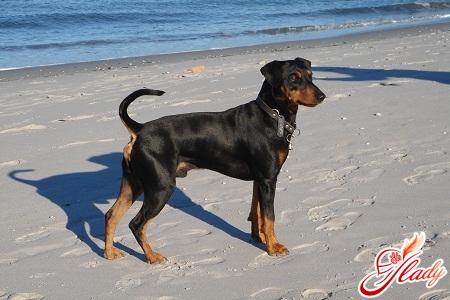 When the animal is sick, then the owner is not sweet either! Firstly, madly sorry for the poor fellow, secondly, time (which is already in short supply) is required, and special knowledge too would not be superfluous. Therefore, we also strive to protect our pets from possible diseases, making them vaccinations, observing diets and visiting a veterinarian on time. However, not all possible sores can be prevented with the help of timely vaccination. Cystitis in dogs is one of the diseases from which there are no vaccinations, and therefore there are no guarantees. What is this disease, where does it come from, how it flows and how it is treated? Let's figure it all out.
When the animal is sick, then the owner is not sweet either! Firstly, madly sorry for the poor fellow, secondly, time (which is already in short supply) is required, and special knowledge too would not be superfluous. Therefore, we also strive to protect our pets from possible diseases, making them vaccinations, observing diets and visiting a veterinarian on time. However, not all possible sores can be prevented with the help of timely vaccination. Cystitis in dogs is one of the diseases from which there are no vaccinations, and therefore there are no guarantees. What is this disease, where does it come from, how it flows and how it is treated? Let's figure it all out.
What is cystitis?
Cystitis - inflammation of the urinary mucosathe bubble. It occurs absolutely in all warm-blooded animals, including humans. In dogs, this disease occurs in acute or chronic form, and in its manifestation can be infectious, toxic or allergic. However, timely treatment of any form of cystitis, as a rule, is effective. Dogs suffer from cystitis less often than cats, but bear it more heavily. Dog-girls suffer from this disease more often than boys (boys - in general, very rarely). And the age of the animal is almost no role. Cystitis can get sick and the puppy, and quite an adult animal, and an old dog. Factors that make a dog vulnerable to this disease can be: pregnancy and childbirth, constipation, radiation therapy, diseases of the genitals. Naturally, dogs with weakened immunity are also more likely to suffer from this disease. 
Causes of cystitis
The cause of cystitis may be hypothermiaAn animal (bathing in a cold course, drafts, walking on a strong wind or in frosts). But most often canine cystitis is infectious. This disease is caused by streptococci, staphylococci, E. coli, which enter the bladder with blood and lymph, or are deposited there by a dirty catheter. Cystitis can also be associated with sexual infections (yes, animals also suffer from love!), With stones or parasites in the bladder (the result of malnutrition or helminthic invasion). Dog-girls suffering from vaginal inflammation (vaginitis), uterus (metritis) or cysts, can also get cystitis (in passing), as well as boys with inflammation or other diseases of the prostate gland. Poor dog content (non-compliance with basic hygiene, swept and soaked cages) can also trigger the occurrence of cystitis, especially in puppies and in squat and short-necked dogs. As for puppies, the cause of cystitis in them can be abnormalities of the urethra, which you need to treat surgically.
Signs of the disease
First, it is worth noting that in dogs cystitiscan occur and is asymptomatic. That is, there are no obvious signs of the disease, but there are implicit signs. The animal can become too lethargic or vice versa, unusually aggressive. In this case, it is possible to diagnose cystitis only in the laboratory. However, most often the symptoms of cystitis are pronounced. The first and most obvious sign of the disease is frequent urge to urinate, soreness and lack of control over the process. Therefore, if your well-bred dog suddenly wrote at home, this may be one of the signs of the disease. In this case, the owner should pay attention to how often the dog asks (or walks) to the toilet in a small way, how much (by volume) she pisses at the same time. The sick animal will urinate in small portions, but often. Other obvious symptoms of cystitis are clouding of urine, the appearance of mucus or blood in it, purulent discharge on the genital organs. Pressing your fingers on the bottom of the dog's abdomen will be painful for her: the animal may begin to worry, whimper, or even snap. Symptoms that may be signs of not only cystitis, but also other diseases: loss of appetite, increased thirst, vomiting, fever. Once you notice these symptoms, you should immediately contact the veterinarian. It is the doctor who will be able to give the dog a correct diagnosis, to determine the severity of the disease and to prescribe an effective treatment. 
Treatment of cystitis
The main course of treatment for a dog will be appointed by a veterinarianonly after the results of laboratory tests. Most likely, you will write out a prescription for antibiotics, possibly prescribe a procedure for washing the bladder, as well as taking medications that relieve spasms and pain. Your participation in the treatment of the dog is simply necessary, but please do not be too presumptuous and do not buy antibiotics yourself. Only the veterinarian will be able to determine which medicine will be most effective, and how to treat cystitis in your dog. And what needs to be done to you, so that the treatment is effective, and the recovery of the pet (or pet) is fast? To begin with, create the dog all the conditions for a comfortable "bulletin". Try to worry as little as possible about the animal, be gentle with him (but unobtrusively). If you are forced to stay out of the house for a long time, then put a cloth in the hallway, on which the animal could emptify in your absence. Collect all the carpets from the floor, as the dog may not use the "toilet" offered to her. And do not scold her for these faults: a cystitized dog can not control her bladder. Also, you need to ensure that the dog always had clean and fresh water for drinking. By the way, you can offer her and a decoction of leaves of bearberry (helps with cystitis). Plant your dog on a special diet: vegetables, dairy products. And be sure to follow all the instructions of the veterinarian. Timely and correct treatment guarantees a favorable prognosis: cystitis in dogs can be cured. The main thing is not to delay the visit to the doctor at the first suspicions of the disease. By the way, for prevention purposes, you can give the dog cranberry juice, which prevents the formation of stones in the bladder and has antibacterial properties. Be healthy! We advise you to read:









